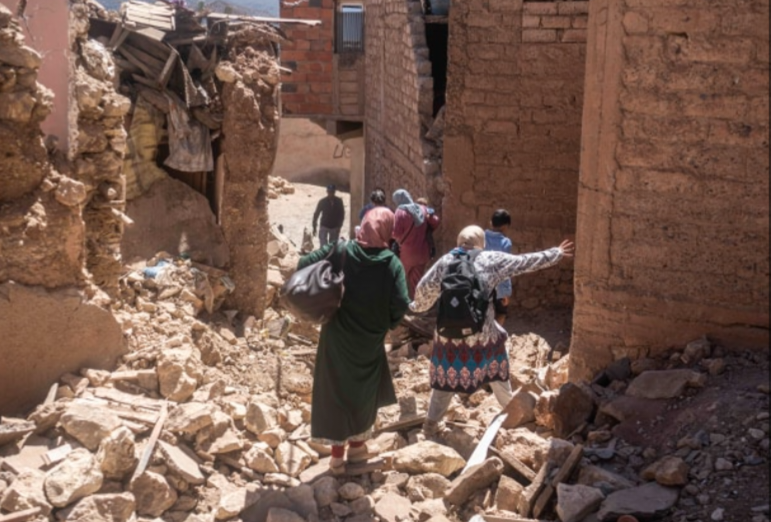Marrakesh. International teams of rescuers have joined Moroccans in a race against time to find survivors in the rubble three days after a rare earthquake devastated the country.
More than 2100 people have been killed, and the toll is expected to rise as searches continue in hard to reach villages in the High Atlas Mountains.
Teams from Spain and Britain joined efforts to find survivors of the 6.8 magnitude quake that struck late on Friday night 72 kilometres south-west of Marrakesh.
Many survivors spent a third night outside, their homes destroyed or rendered unsafe by Morocco’s most powerful earthquake since at least 1900. The death toll climbed to 2122 with 2421 people injured, state TV reported on Monday (AEST).
In the village of Tafeghaghte, Hamid ben Henna described how his eight-year-old son died under the rubble after he had gone to fetch a knife from the kitchen as the family shared their evening meal. The rest of the family survived.
People have been salvaging possessions from the ruins of their homes and describing desperate scenes as they dug with their bare hands to find relatives.
The damage done to Morocco’s cultural heritage has been emerging gradually. Buildings in Marrakesh’s old city, a World Heritage Site, were damaged. The quake also reportedly did major damage to the historically significant 12th-century Tinmel Mosque in a remote mountain area closer to the epicentre.
Survivors struggling to find shelter and supplies have voiced criticism of what they have described as an initially slow government response.
Morocco has deployed the army as part of its response and has said it is reinforcing search-and-rescue teams, providing drinking water and distributing food, tents and blankets.
State television reported on Sunday, Moroccan time, that the government might accept relief offers from other countries and would work to coordinate them if needed.
Search-and-rescue specialists with sniffer dogs have been sent by Britain and Spain. For its part, Qatar said its search-and-rescue team had departed for Morocco. Spain said it received an official request for aid on Sunday.
It was then that a magnitude 3.9 aftershock rattled residents as they mourned victims, according to the US Geological Survey.
The United Nations estimated that 300,000 people were affected by Friday night quake and some Moroccans complained on social networks that the government wasn’t allowing more outside help, with some growing frustrated waiting for it to officially request assistance.
France said it stood ready to help and was awaiting a formal request.
“We know there is a great urgency to save people and dig under the remains of buildings,” said Arnaud Fraisse, founder of Rescuers Without Borders, who had a team stuck in Paris waiting for the green light. “There are people dying under the rubble, and we cannot do anything to save them.”
Help was slow to arrive in Amizmiz, where a whole chunk of the town of orange and red sandstone brick homes carved into a mountainside appeared to be missing. A mosque’s minaret had collapsed.
“It’s a catastrophe,” said villager Salah Ancheu, 28. “We don’t know what the future is. The aid is insufficient.”
“There aren’t ambulances, there aren’t police, at least for right now,” Ancheu said.
King Mohammed VI thanked Spain, Qatar, the UK and United Arab Emirates for sending aid, state TV reported. Morocco had assessed aid needs and considered the importance of coordinating relief efforts before accepting their help, it added.
With many homes built of mud bricks and timber or cement and breeze blocks, structures crumbled easily. It was the North African country’s most lethal earthquake since 1960 when a major tremor was estimated to have killed at least 12,000 people.

